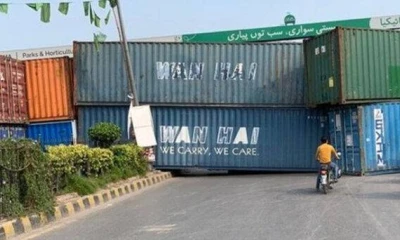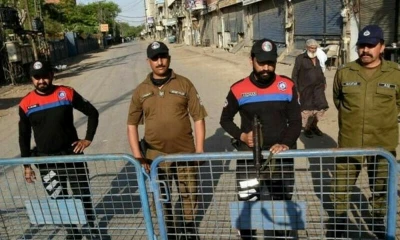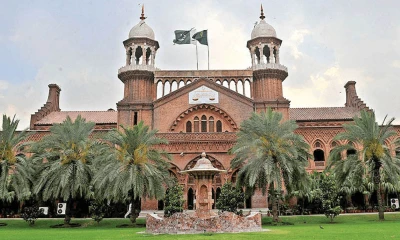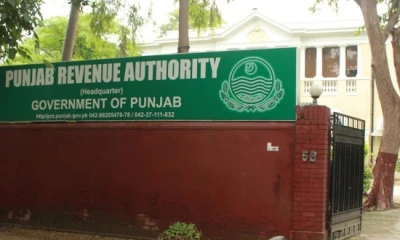Regional
It’s not just famous actors and big-name writers the Hollywood strikes are hurting
From struggling writers and actors to makeup artists and camera operators, a look at how workers in and outside of Hollywood are being hit by the WGA and SAG-AFTRA strikes.
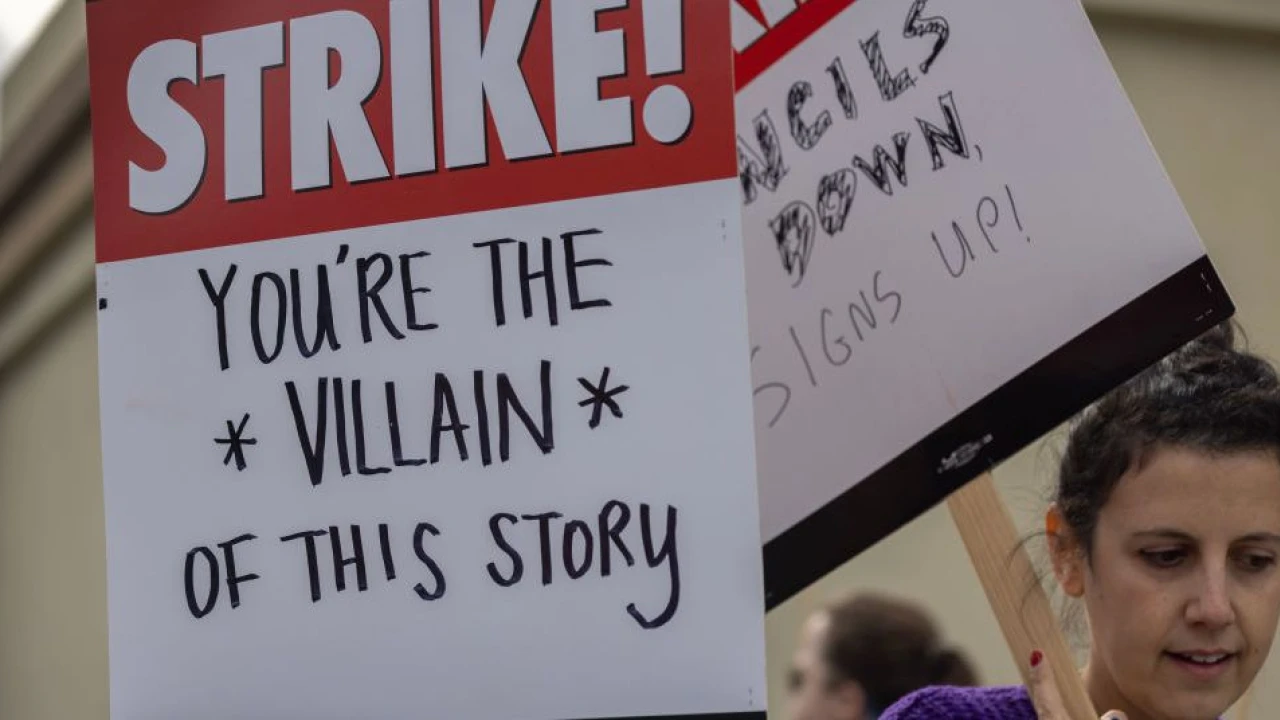
There’s a special kind of torture to events with no end in sight. “In a lot of ways, it feels like the pandemic, round two,” says Meghan Pleticha, a Los Angeles-based writer, of the current writers’ and actors’ strikes that have much of the entertainment industry at a standstill. She doesn’t mean the illness-and-death part, but rather the will-this-ever-end part. Momentum ebbs and flows, and every day feels like a haze.
The past several years have taught Pleticha, who previously wrote for HBO’s Silicon Valley, how to scramble to get by — and those rough years are part of how writers were pushed to this point in the first place. That doesn’t make any of this particularly pleasant. She had been picking up work as a script coordinator, which is not a writers’ union job, to cover her bills as of late. The shutdown has taken that off the table, too. “I totally support the strike, it’s just interesting that it has also affected my backup,” she says. “I do have the benefit of also understanding how it affects crew. It’s rough, because they didn’t ask for this fight.”
Some 11,500 Hollywood writers, represented by the Writers Guild of America (WGA), walked off the job on May 2 and have been on strike since then. Then, 160,000 actors under the Screen Actors Guild and American Federation of Television and Radio Artists (SAG-AFTRA) went on strike as well on July 14. Both are stuck in contract negotiations with the Alliance of Motion Picture and Television Producers (AMPTP), which represents Hollywood studios and production companies.
Production on television and movies has ground to a halt as a result, and there’s no clear end in sight. The WGA and the AMPTP are at least talking again; SAG-AFTRA and the AMPTP aren’t even doing that.
The general consensus is that this is going to drag on for a while, which has significant ramifications not only for writers and actors but also for thousands of workers and businesses whose lifeblood depends on entertainment — directors and production assistants, caterers and hairdressers, prop makers, drivers, dry cleaners, stores, and more. One person told me it’s like you could “shoot a cannon” through some LA restaurants at this point. The strikes have already cost California’s economy an estimated $3 billion.
“I’m talking about atrophy in the industry. We say Hollywood, but I’m feeling it across New York, I’m feeling it in London,” says one industry executive, who agreed to speak with Vox on the condition of anonymity. “That atrophy is that nobody knows anything, so everybody’s kind of half in limbo, half trying to work, and then you have this whole secondary support industry that is really, unfortunately, getting hit hard.”
“It’s a shitty situation. I don’t know how it’s going to last, and I’m scared when it’s over I’m going to be truly fucked,” Pleticha says. “But in the short-term, it’s ‘okay,’ question mark?”
Writers and actors are not having a bang-up time here
Many writers and actors who support the strike are quick to admit they would rather not be dealing with this situation and that, in ways big and small, the whole thing has been difficult. Financially, it’s caused hardships. Uncertainty about the future is anxiety-provoking. Also, it’s hot standing out on the picket lines. Still, people remain committed to the cause. They’ve seen the reports the AMPTP is waiting for them to “bleed out” and “start losing their apartments and losing their houses,” and they’re irked by them. (Disclosure: Vox Media’s editorial team is unionized with the Writers Guild of America East. But its members are not part of the strike covered in this story, nor are they part of the contract negotiations with AMPTP.)
“People are tired of being on strike but are not wavering in their demands,” says Nicole Conlan, who moved to New York at the start of the year for a job at The Daily Show. “None of us want to be out there, but none of us want to give up either.”
The scenario for a lot of people on strike is one of career, interrupted. Work in writing and acting is often already unstable, which some begrudgingly say has made them better able to weather the current storm. Plenty of actors are used to having to pick up side jobs to try to stay afloat. When it comes to writing, it used to be the case that you could really build a career behind the scenes. Thanks to the prevalence of streaming, which has meant shorter seasons and less pay for writers, and the adoption of smaller “mini rooms,” among other issues, that’s increasingly untrue. Though hey, if artificial intelligence takes everyone’s jobs and, as one person put it, people don’t lock down control of their digital twins, then nothing else matters. It’ll be career, over.
Luke Slattery, an actor based in New York, jokes that he’s held down all manner of side hustles over the years, working at bars, building sets, briefly working as a double-decker tour bus guide. He felt like he was finally taking off as an actor, with a recurring role on a TV series under his belt and a role in an upcoming film on the horizon. “Then boom, Covid happens, then I pick up a little more steam, and then boom, a dual strike that cripples the industry in a pandemic-level fashion,” he says.
Slattery is back hunting for side hustles, and in the meantime doing motion capture for video games and some voiceover work, which is still allowed. He wonders whether the movie he’s in will still come out on Christmas Day, and whether the strike will be lifted so he’ll be able to do promotion for it. He also wonders when he’ll need to pick up another restaurant gig. “You can’t replenish your bank account, but you can replenish your hope by going to the picket line and being reminded you’re not alone,” he says.
Solidarity does not help pay the rent, however.
The timing of the strikes for Aditya Joshi, also in New York, feels like a cruel joke from the universe. He and his writing partner were working corporate jobs before getting hired on an Amazon show in March. They quit, moved out to LA, and then worked as full-time, fully employed writers for a matter of weeks before the WGA strike happened. “Part of the reason I worked a job for a long time was to help through fallow periods when I actually did make the transition,” he says. “I didn’t really expect that transition would happen immediately after I left.” It’s not like he can waltz back to his former employer and ask for his job back, especially if, presumably, once the strike ends his writing position is still there.
So for now, he’s back in New York, living off of savings, picking up some other work here and there, and trying to get material ready for whenever there’s an agreement. He just got approved for unemployment insurance, so that should help. (Striking workers can get unemployment benefits in New York; they can’t in California.)
Disruption is always jarring. Disruption without a clear endpoint even more so.
One Los Angeles writer sold her very first pilot earlier this year. It felt like years of hell had paid off, but then the strike happened. She’s had to ask her parents for money. “I think that my show will be there on the other end — it’s just scary,” she says. Another LA-based striker has been a staff writer on a streaming show for the past two years and knows that job will be there on the other side. That doesn’t help his situation right now. He’s taken out a pair of interest-free $4,000 loans from the WGA that he’ll soon be faced with paying back, a prospect he’s not thrilled at, given he finally finished paying off his student loans a year ago. “I love my union and they are a great union in a lot of ways, but I wish I wasn’t in debt again,” he says. (Vox granted both writers anonymity so they could speak candidly about their situations.)
For others in Hollywood, it’s weird to be losing a fight they can’t really win
To the general public, it’s easy to overlook just how many people these impasses between writers, actors, and the studios are impacting. The strikes are costing California billions of dollars, and they’re a knock to the economies in places such as New York and Georgia as well. Many workers have been laid off, from costume designers and stylists to agents and support staff. There are workers and businesses for whom the immediate stakes are quite high and quite material, and those for whom the longer-term stakes are fuzzy. The goal for writers and actors is they hopefully get a better deal. For others, it’s that they get to go back to work.
Hollywood had been slowing down since the start of the year, in part because of the end of the streaming boom, and in part in anticipation that these labor stoppages were on the horizon. That means for many people, instead of it being three months of slow work since the writers’ strike began, it’s actually been eight months.
Zack Auron, who does union electric work as a member of the International Alliance of Theatrical Stage Employees (IATSE) and non-union camera work, says jobs have been dwindling since before the pandemic started. In union meetings, members encouraged each other to keep their comrades in mind for jobs, noting that qualifying for health benefits depends on the number of hours worked in a certain period. Now, he sees union members coming in to compete for the non-union jobs he picks up — corporate gigs, music videos, commercials, documentaries, and narrative shorts, often jobs that pay less and don’t help with health insurance but can help cover rent. “Absolutely, other people that I know have just turned completely outside of the film industry to make ends meet,” he says.
One thing that’s true in any industry, including TV and film, is that it’s not so easy to just pick up and do something new. People make long-term investments in their businesses and careers, developing know-how and expertise. Presumably, once the dust settles, the desire is for people to be able to come back. It’s a question of how long they can hold out.
Pam Elyea, the vice president of History for Hire, a prop shop based in LA, who has been in the business for 40 years, warned her staff at the start of the year to batten down the hatches, something she was trying to do herself. She’s had to lay some people off, as she’s seen her business fall to about a quarter of what it normally is. It’s pandemic-like, economically, the difference being that then the government swooped in with loans for small businesses and stepped up unemployment. In the current moment, no such help appears to be immediately on the way, though she’s hopeful something might come through on the city or county level. She can’t picture what the end of this strike will look like, given that the stakes are about so much more than money. “This time around, the things that are being negotiated are real values, human values about AI and the value of your image and your right to be yourself and not be replicated,” she says.
Courtney Hart, a celebrity makeup artist, also worries about what the light at the end of the tunnel might look like, and whether for her it might be a bit dimmer. She gets hired by studios to do makeup for actors and actresses on press junkets and red carpets and editorial features. She was supposed to be headed to Comic-Con right before the actors went on strike. Hart says she and her fellow artists are “1,000 percent” supportive of the strike, even if they’re apprehensive about what comes next because they’re not unionized. “We don’t have any protections in place from studios cutting our rates because of the strike, so a lot of people are very concerned about what happens post-strike for us,” she says, noting rate-cutting is what happened post-Covid. “It’s such insane corporate greed — they’re always looking for ways to cut costs, and we are very easy targets.” She hopes her fellow makeup artists will all band together and refuse to accept lower rates.
All of the non-writers and non-actors I spoke with for this story expressed support for the strikes. They know where the WGA and SAG-AFTRA are coming from and recognize the stakes. They also get that they could — and have — found themselves on the other side of the table, formal or otherwise, from the AMPTP and the studios.
Still, many acknowledged that it isn’t always easy.
The Directors Guild of America (DGA), which represents directors, reached an agreement with the studios in June that has been some cause for consternation internally and externally over whether they should have taken the deal. One assistant director and member of the DGA who agreed to speak on the condition of anonymity said she was careful not to wear any gear showing her union affiliation while joining one of the picket lines recently. “It’s mixed reviews out there for people if they know you’re in the DGA,” she says, though she notes the people who saw her affiliation on the sign-in sheet that day were very nice.
Striking writers disrupted and shut down the filming of the show she was trying to wrap in May — she insists the production wasn’t afoul of the WGA’s rules — and the tactics stung a bit, especially after a writer pretty high up on the pay scale bragged about the incident on social media. “By all means, get what you can get and what you should get,” she says. “But at the same time, realize that it’s hurting others in the process, and while you may be able to recuperate that … below-the-line crew like IATSE might not.” IATSE, which represents behind-the-scenes workers, narrowly avoided a strike in 2021 and reached a three-year deal with the AMPTP.
This feels like a “remember who the real enemy is” situation
There appears to be a consensus among many workers of all stripes in TV and film that while this may be tough right now, it won’t be that way forever, and it’s worth it. There’s also an appreciation for each other’s support.
“This strike, unlike previous strikes, has this unprecedented level of support from the unions that represent everybody, top to button, on the productions,” said Matt Kellard, an LA-based writer. “That should tell you something in terms of the importance of it and the level at which all of Hollywood is united to win this thing. Even the folks really hurting and not most directly affected by negotiations, the fate of this strike determines their fate down the road.”
There are options for those who are really struggling as a result of the strikes, financially, to try to get support. The WGA and SAG-AFTRA have financial assistance available to their members who are most in need. There’s also the Entertainment Community Fund, a human services organization for everyone working in performing arts and entertainment dating back to 1882. It’s an emergency fund, meant to help people meet basic needs, and its average grants range between $1,500 and $3,000.
Amid the strikes, the fund has been inundated with asks, says Barbara Davis, chief operating officer for the Entertainment Community Fund. On an average week (not during the height of Covid), they would provide between $50,000 to $75,000 a week in emergency financial assistance, she says. In July, they were averaging $500,000 a week, and recently, that amount shot up to $700,000. The organization’s other support programs have seen a significant uptick in usage, too.
“The biggest challenge is to continue to raise funds,” Davis says. “We’ve had wonderful support particularly from people in the industry and who care about people in this industry, but for us to be able to sustain these efforts ongoing, we need to continue to be able to do everything we can.”
The tough part about the Entertainment Community Fund is that it’s aimed at people who are in their most dire moments — it’s not particularly helpful in stopping them from getting there.
Among certain circles, it feels exciting to celebrate this supposed summer of strikes, to applaud workers trying to stand up for their rights and fighting back. In relation to the actors’ and writers’ strikes, it’s exhilarating to see people on the picket lines, to see the kitschy signs and hear the moving speeches from big-name actors. (There’s a reason these people have these jobs, eh?) At the same time, the realities of labor rights and strikes are much more complicated and hard. Walking out of the job has a real financial and emotional cost for those doing the walking, those being walked away from, and those who wind up collateral damage. It’s also important to remember that despite the excited headlines, unions are actually declining in the US. The power being put on display by the outfits currently on strike exemplifies why they matter.
Hollywood is in a collective state of mixed emotions at the moment — hopeful but afraid, excited but anxious, resolved but insecure. One writer frets whether studios just don’t want to make movies and TV at all anymore, and this is their way of forcing them out. She doesn’t think that’s the likeliest scenario, but what if it is? One assistant director is confident agreements would be reached but also wondered just how long it would take her to get back to work. Best case scenario, she thinks, is early 2024. One person wondered about awards season, another worried just how much the studio pie is actually shrinking. Again, god, it’s hot on the picket lines.
“The studios could end this tomorrow,” Conlan, The Daily Show writer, says. “The studios come out with this point all the time that people just want to get back to work, and it’s like, well, you have the money to make that happen immediately.”
-

 Technology 2 days ago
Technology 2 days agoCrypto giant Bitcoin touches record high of $100,000
-

 Business 1 day ago
Business 1 day agoGold glitters again in Pakistan after global price hike
-

 World 2 days ago
World 2 days ago'Negligent act': Indian Navy submarine collides with fishing vessel
-
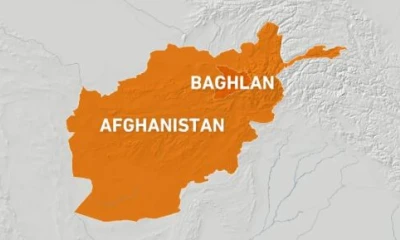
 World 2 days ago
World 2 days agoGuman kills 10 in attack on Sufi shrine in Afghanistan: interior ministry
-

 Pakistan 2 days ago
Pakistan 2 days agoCOAS Asim Munir vows to dismantle hostile terrorist networks
-

 Regional 1 day ago
Regional 1 day agoCM Maryam visits Nishtar Hospital, suspends paramedics over AIDS spread
-
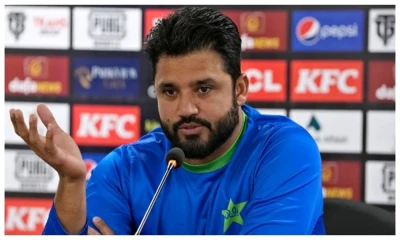
 Sports 2 days ago
Sports 2 days agoPCB appoints Azhar Ali as head of youth development
-

 Business 2 days ago
Business 2 days agoGold prices rise sharply in Pakistan


